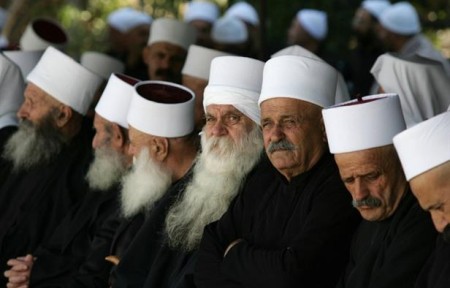PHOTO: Druze sheikhs in southern Syria (Louai Beshara/AFP)
Attention on Syria’s Druze is likely to increase, given the approach of rebels to the borders of Suweida Province in the south, where many members of the religious community live.
Will Druze men continue to fight alongside the Syrian military, as they have in the recent defense of the al-Thala airbase? Or will they resist, as some have when facing conscription and the movement of military equipment out of the province? Will the Druze leadership decide, in their maneuvers to maintain political space and security, to work with rebels or keep them at distance?
Alexander Ayoub of Al-Araby al-Jadeed profiles one Druze sheikh, Walid al-Balous, who has been causing concern for the Assad regime.
Sheikh Wahid al-Balous is a leading elder scholar in the Druze community of the Suweida Governorate in southern Syria.
And Sheikh Balous has been breaking some taboos.
Surrounded by his men and other elders, known as Sheikh al-Aqls, he recently appeared in a video talking about the situation in their governorate after the Syrian revolution.
He threatened Wafiq Nasser, the head of the province’s military security service, in the sort of outspoken remarks that are not often aired in public.
Unsurprisingly, the footage has started to go viral.
“Our dignity is more important than Bashar al-Assad,” he said.
Wahid al-Balous and his group of militants in Suweida have earned themselves the nickname “the Sheikhs of Dignity” among supporters, who compare them with the other traditional community leaders — Sheikhs al-Aql — who have supported the regime since the start of the uprising.
By contrast, Wahid al-Balous, or — as he is known in Suweida — Abu Fahd, chose a middle ground between the regime and the opposition.
Since then, there have been multiple encounters with the regime.
The Rise of Sheikh al-Balous
With the start of the Syrian revolution, the regime suffered many defections in its army. Many youths also tried to avoid military service. This prompted the regime to conscript young people in several governorates, including Suweida.
There has also been a wave of kidnappings between groups in Daraa and Suweida, long-standing disputes with Bedouins in the region, and lax security as a result of the deliberate or unintentional absence of the state.
Al-Araby al-Jadeed spoke to a close associate of Balous, who asked to remain anonymous for security reasons:
His name began to emerge with the rise of armed groups affiliated to sheikhs who said they were neither in the opposition nor the pro-government camp. They just wanted to keep the mountain [Jabal al-Arab, home to many in the Druze community] away from the conflict and protect its people, and prevent youths from Suweida from being forcibly dragged into military service and used in a war that had no clear direction.
When the situation between Daraa and Suweida became tense, Balous kidnapped people from Daraa on multiple occasions to swap them for people from Suweida who were kidnapped in Daraa. All parties that kidnap people in Suweida hand them over to Sheikh Balous, who treats them well until they are swapped.
The first clash between the regime and Balous took place during the 2014 Presidential election, after the regime’s security services forced a woman with mental health problems from Suweida to parade with a portrait of President Bashar al-Assad.
This prompted Sheikh Balous and a number of his men to destroy a tent used by Assad’s campaign.
Later, the so-called Battle of Dama was the turning point that set the tone of the emerging relationship between Balous and the regime. In that battle, Sheikh Balous fought alongside the regime against al-Nusra Front, after the militant group raided Dama’s village and monastery.
The Nusra Front was expelled. But after the battle, Sheikh Balous accused regime forces of betraying him and firing at his men, reportedly killing five.
The battle destroyed any confidence may have had in Damascus. When the regime tried to summon youths from the province for military service, the Druze sheikhs — including Balous — intervened by force and prevented the military security service from taking the boys.
The most recent incident saw Balous’ men destroy a checkpoint belonging to the air force intelligence agency in Suweida, when military officers attempted to apprehend a young man from a bus and were insulting people queuing at the outpost.
Balous demanded the regime remove the checkpoint. After they refused, Balous’ fighters men attacked the checkpoint the following day and removed it by force.
Standing up to the regime in this way has made Balous a popular figure in Suweida. Some residents say he is defending their dignity, prompting many to join his group.
The regime appears to have turned a blind eye to his rising popularity, perhaps because Damascus is aware of the disastrous repercussions of harming a cleric like Balous in Suweida.
But Balous’ men have recently stepped up protection measures around his home anyway, fearing he could be assassinated by agents of the regime.

